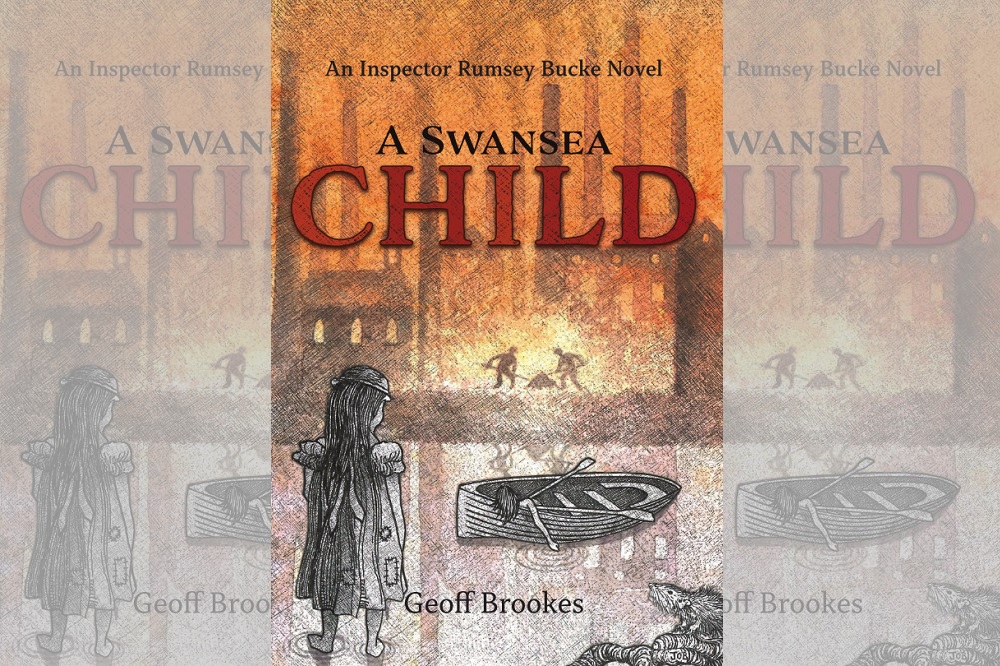Review: A Swansea Child by Geoff Brookes

Myfanwy Alexander
I have never been a minimalist, as visitors to my cluttered home are immediately aware: I do not subscribe to the concept that less is more and I have never seen a lily I do not wish to gild.
Slim volumes of exquisitely crafted prose leave me cold: my tastes were, I think, formed by the sprawling novels of the 19th Century and to me, if you enjoy a book, you feel cheated if there is not an absolute wealth of character, subplot and narrative twist on which to feast.
Exotic tale
‘A Swansea Child’ is exactly this sort of feast, a veritable plum pudding of a novel full of rich delights.
The story is set in a vividly drawn portrait of Victorian Swansea, a teeming town whose social divide provides a constant underlying theme.
There is money to be made in Brookes’ Swansea and many of the characters are engaged in such a variety of scams that the lot of the policeman seems to be particularly difficult, even nightmarish.
The novel opens with an exotic tale, reminding us that Swansea, as a thriving port, is open to influences from a wider world and this novel becomes the central plot but after fifty pages or so, I confess I cared a good deal more for the home-grown horrors than for imported troubles, though this central narrative is well-maintained and leads to a deliciously shocking conclusion.
It is evident that Brookes has researched the period not just with care but with real enthusiasm and his empathy for the poor is a strong feature throughout.
This empathy leads him to give each urchin, tart or sailor a distinct character of their own and the ways in which they all interact gives the reader a strong sense of observing a real community though, at times, the speed at which new characters are introduced is somewhat giddying.
This capacity to create well-expressed characters is a real strength of the novel though it does have the side-effect of leaving readers wishing there was more opportunity to explore several of the subplots.
The music hall singer, for example, was well drawn enough to warrant a novel of her own and I would have relished hearing what exactly were the catastrophic errors which had led to her difficult circumstances.
Absolute poverty
Though this novel is, in essence, an entertainment, it shares with Dickens the ability to highlight the suffering of the poor whilst telling a good tale.
The character of the proto-socialist doctor gives voice to some trenchant thoughts about the injustices of society but it is the lives of the poor themselves which is the most powerful evidence against Victorian values.
The bleakness of the life in the vicarage seems to prove that economic security is not all that matters but Brookes does not shirk from exploring what absolute proverty requires of those enduring it.
Vividness
His research gives an unusual vividness to the experiences described though there is one respect in which I felt his modern sensibilities did obtrude a little.
He clearly regards the collection of human urine for industrial purposes as a singularly disgusting trade, and I certainly am not suggesting that it is not grim but in the context of a society in which match girls had their jaws eaten away with phosgene and hatters suffered brain damage from the mercury they used every day, a barrel of human waste is perhaps not quite so nauseating.
Pubs in my part of the world collected urine for the woollen industry until well after the Second World War and it was regarded very much as a practical business, keeping places open in lean times.
Victorian Swansea
Inspector Ramsay Bucke is our protagonist: his intelligence and compassion help the reader to see the Gothic panoply of Victorian Swansea on a human scale.
The breakneck pace of the narrative gives little time for Inspector Bucke to engage in introspection and I would have welcomed learning a little more about him.
His love interest, Constance, is well-drawn but generates my only serious qualm about this novel. Constance has been abandoned by her abusive husband from whom she is seeking a divorce and she earns her living by giving piano lessons.
Her position is, therefore, both socially and economically, highly precarious and she could not risk the catastrophe which disapprobation would bring. She might indeed fall in love with the gallant Inspector but would they, realistically, in a town full of gossip, jump into bed together?
In a post-Freudian world, we might expect all our characters to be sexually active but for two middle-class Victorians, it would not be normal or expected for affection to immediately lead to physical love.
However, one cannot expect to applaud absolutely every raisin in an excellent plum pudding and I can heartily recommend this tasty dish of a novel.
A Swansea Child by Geoff Brookes is published by Cambria Books. It is available from all good bookshops or you can buy a copy here.
Support our Nation today
For the price of a cup of coffee a month you can help us create an independent, not-for-profit, national news service for the people of Wales, by the people of Wales.





